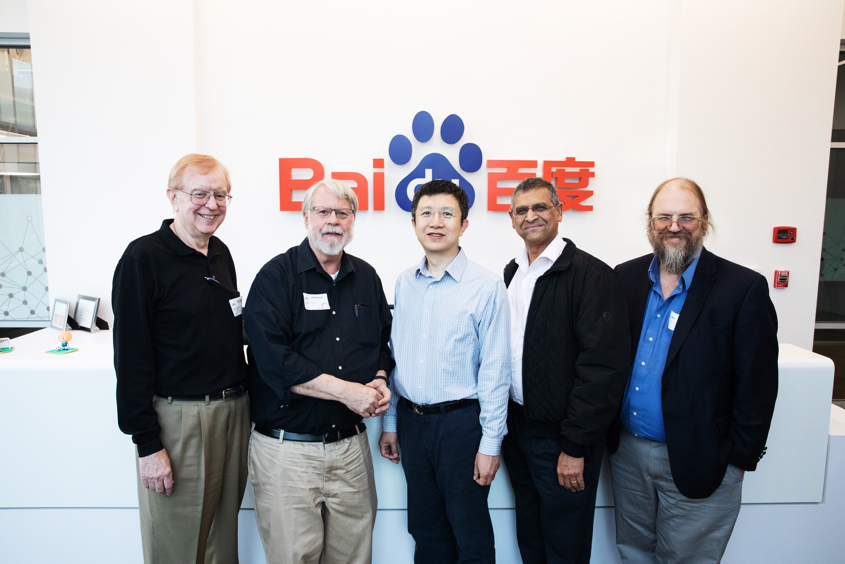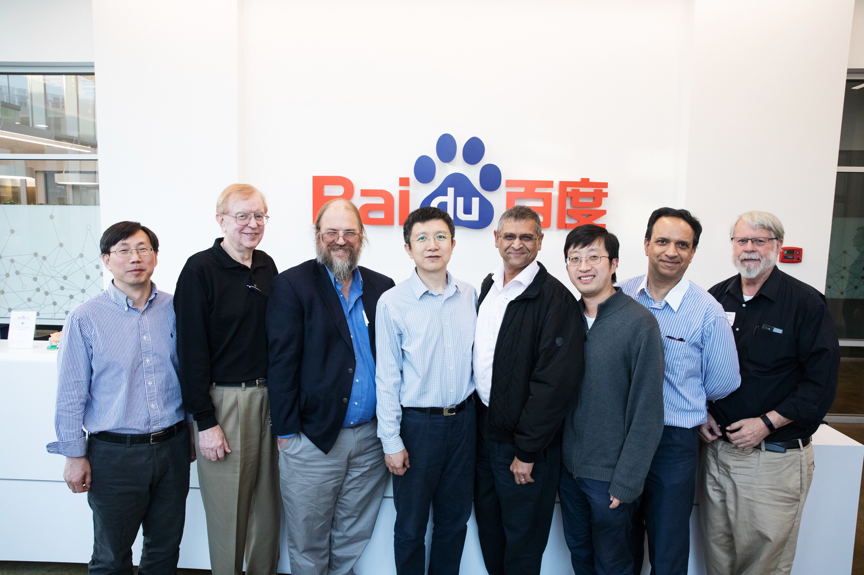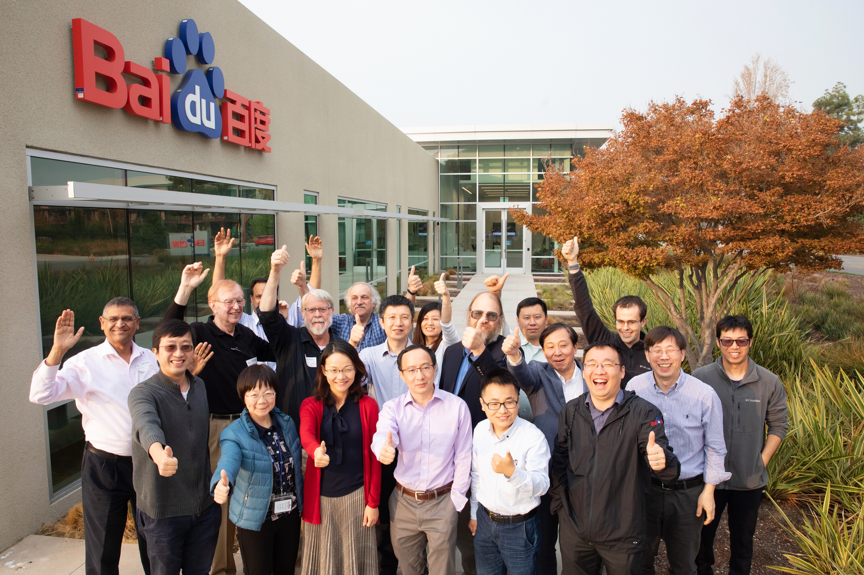2018-11-15
Back to listOn November 13th, Baidu Research announced the launch of the Baidu Research Advisory Board, a think tank which brings together five top scientists with a vision of advancing AI technologies for the future. The Board, which held its first meeting on November 13th at Baidu USA, California, was established as an advisory body to provide technical guidance in areas related to Baidu’s AI expertise and visions for future opportunities.
The five distinguished scientists joining the Advisory Board are Dr. David Belanger, former Chief Scientist and Vice President at AT&T Labs; David Forsyth, Professor of Computer Science at the University of Illinois at Urbana-Champaign; Mark Liberman, Christopher H. Browne Distinguished Professor of Linguistics at the University of Pennsylvania; Martial Hebert, Director of the Robotics Institute at Carnegie Mellon University; and Vipin Kumar, Regents Professor and William Norris Chair in Large Scale Computing at the University of Minnesota.

Dr. Haifeng Wang (the middle) and Baidu Research Advisory Board members Dr. David Belanger, Mark Liberman, Vipin Kumar, and David Forsyth (from left to right)
“Academic research has always been an important part of the core competitiveness of AI,” Dr. Haifeng Wang, Baidu’s Senior Vice President, Head of Baidu AI Group and Head of Baidu Research, said in his opening remarks welcoming the board members. “This newly-established Advisory Board will infuse academic forces into AI research at Baidu Research, enabling it to lay out a comprehensive blueprint for forward-looking research. Joining forces with these scientists, we will continue to solve AI problems in the future in order to better serve our society and improve lives through AI technologies.”
At the first board meeting, the board members shared the latest insights from their respective fields including information mining, computer vision, voice technology, robotics and data mining, among others. By functioning as a think tank for Baidu Research, the experts will bring these frontier research experiences to Baidu to both bolster results and advise on future opportunities based on Baidu’s current AI capabilities. Dr. David Belanger, former Chief Scientist and Vice President at AT&T Labs, said: “We believe that Baidu is a leader in AI research in the world and is advancing rapidly.”
Baidu Research consists of five labs: Institute of Deep Learning (IDL), Big Data Lab (BDL), Silicon Valley AI Lab (SVAIL), Business Intelligence Lab (BIL) and Robotics and Autonomous Driving Lab (RAL), which cover natural language processing (NLP), computer vision, voice technology, big data, autonomous driving, robotics and Artificial General Intelligence. Focusing on fundamental technologies in cutting-edge areas and future prospects of AI development, Baidu Research is headed by Dr. Haifeng Wang, along with many renowned scientists such as Dr. Kenneth Church, a foremost scientist in empirical methods of NLP.
Additionally, Baidu Research has also announced that it had brought on four new experts throughout 2018. Liang Huang, NLP & machine translation expert, and Guodong Guo, computer vision & biometrics expert have joined Baidu Research, while Yi Yang, professor of the Faculty of Engineering and Information Technology, University of Technology Sydney (UTS), and Dinesh Manocha, Paul Chrisman Iribe Chair of Computer Science and Electrical & Computer Engineering at the University of Maryland at College Park, are serving as consultants to the company.

Dr. Haifeng Wang (the 4th from the left) and Advisory Board members and 2018 hires
During the board meeting, Baidu Research also highlighted recent progress across 9 areas including NLP, voice technology, high performance computing, deep learning and more.
Natural Language Processing: Baidu has built the biggest Chinese knowledge graph and has won multiple international awards, such as the AI for Prosthetics Challenge. Thus far, Baidu NLP technology has been adopted by nearly all Baidu applications, is used more than 100 billion times every day and is available on the Baidu AI open platform.
Machine translation: Baidu recently released ‘Simultaneous Translation and Anticipation and Controllable Latency’ (STACL), a system capable of simultaneously translating between two languages with low latency and high quality. STACL technology has already been deployed in Baidu’s simultaneous translation product.
Speech Synthesis: Baidu released the first end to end deep neural network model which can synthesize speech that sounds like a human voice.
Medical Treatment: Baidu has open sourced a powerful deep learning based algorithm that can detect whether cells are tumor cells or normal cells. This system can potentially aid doctors in cancer diagnosis and treatment.
Robotics: Baidu has developed the world’s first vision-based, low-cost sensing control system for construction machinery. The unmanned excavator powered by the solution can reduce labor costs by 40% and increase project income by 50%.
Business Intelligence: Baidu invests in the research and development of basic capabilities such as Point of Interest (POI) knowledge graphs and user profiling, and has successfully applied these capabilities to urban computing and the Baidu Map products.
High-Performance Computing: Baidu is a founding organization of MLPerf, an internationally-recognized benchmark that evaluates deep learning performance and has significant global influence. At present, it has been joined by more than 50 companies and seven top universities including Harvard.
Deep Learning: As the only open-source deep learning framework in China, Baidu’s PaddlePaddle recently released its latest version - PaddlePaddle 1.x. Baidu has also developed automatic deep learning technology – AutoDL, which is tested on open test sets. AutoDL’s design capabilities are more advanced than human experts and maintain world-leading indicators in the industry. Baidu allows developers to access this capability through Baidu’s EasyDL and AI Studio platforms for free.
Big Data: Baidu has a world-leading quick search algorithm and places importance on the ongoing development of a practical machine learning algorithm platform.

Baidu Research Scientists